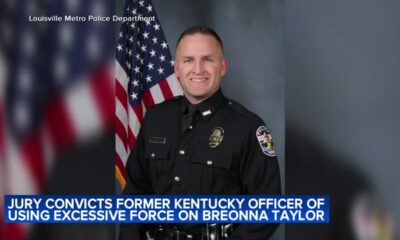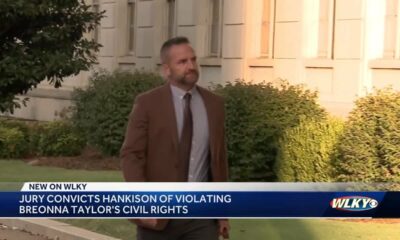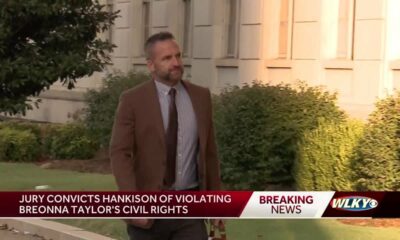Mississippi News
‘The Movement Made Us’: Father and son reflect on past
In ‘The Movement Made Us,’ father and son reflect on the past, both remembered and forgotten
David Dennis Jr. grew up with two versions of David Dennis Sr.: one, an activist at the very center of the civil rights movement who skirted death countless times; the other, his father, the man whose approval and attention he desperately wanted.
He remembers wondering as a child how his father “could fight for strangers while the people you said you loved the most fell apart,” he described in a letter written to his dad.

It was only through writing “The Movement Made Us: A Father, a Son, and the Legacy of a Freedom Ride” that Dennis Jr. was able to fully reconcile the two.
“(Writing this book) really brought the two together and helped me understand how one informed the other, and how both created this complete person who led to me, and then to my kids, and all of that,” Dennis said in an interview with Mississippi Today.
“The Movement Made Us” is at once historical and intimately personal – the story is of a father and son, through whom the reader gets a glimpse into an entire lineage. It is also a deeply moving account of the civil rights movement in the South by a man who was in the eye of every storm: the Freedom Rides, Freedom Summer, the murder of Medgar Evers and the Harlem riot of 1964.
The book begins with his father as a college student at Dillard University in New Orleans who was initially more interested in ensuring he got his degree and dating an attractive activist than protesting and being arrested. That changed at a meeting following attacks on Freedom Riders in Anniston and Birmingham who were traveling the South in protest of segregation on buses. The meeting was to discuss whether the rides would continue and was attended by Martin Luther King Jr., John Lewis, Andrew Young and other civil rights giants.
It was there that Dennis Sr. heard something that changed the trajectory of his life forever: “Okay, now make your choice, because there’s not enough space in this room for both God and fear.”
After that, all hesitation fell away: he was wholly and completely dedicated to the Movement.
Dennis Sr. went on to serve as field secretary for the Congress of Racial Equality (CORE) in Louisiana and Mississippi from 1961 through 1965 and as co-director with Bob Moses of the Voter Education Committee of the Council of Federated Organizations. He was part of organizing the Mississippi Freedom Democratic Party and worked with Fannie Lou Hamer, Medgar Evers and James Cheney.
He helped find Hamer safety and care after she, along with other activists, were brutally beaten in the Winona jail. He delivered Evers’ eulogy and, if not for a bout of bronchitis, would have been the fourth passenger in the car with Cheney, Andrew Goodman and Michael Schwerner that fatal night in Neshoba County.
Dennis Jr. writes his father’s stories as if his father were telling them himself – he successfully uses in-depth interviews with his father and other civil rights workers, CORE files and correspondence and historical research to write an account that makes the readers feel as if they are Dennis Sr.’s very mind in the middle of these harrowing events.
He masterfully fills in gaps in his father’s memory in ways that are just as telling as if Dennis Sr. had remembered each detail. The two had planned to visit Bogalusa to revisit the stories of the Deacons for Defense and Justice and the site of Bloody Wednesday, but Dennis Sr. came down with a stomach ache before they left. Bloody Wednesday refers to the events of May 19, 1965, when a mob of white people joined by police officers attacked and brutalized Black men, women and children at whites-only Cassidy Park.
Dennis Jr. went without his dad and visited with the organizers and family members of the Deacons for Justice. Valeria Hicks, one of the Deacons, told him it was Dennis Sr. who had sent them to Cassidy Park to desegregate it, having no idea it would turn into a bloodbath.
“I know you’re reading this and laughing,” Dennis Jr. wrote in the letter to his dad in the book about his trip. “Because when I tried to tell you what Mrs. Hicks said, you said that calling for the people in Bogalusa to go to Cassidy Park was one of those memories that got closed away forever, and you still don’t remember doing it but ‘it sounds like something I would have done.’ You also swore your stomach ache came from something you ate or whatever. I believe you on both accounts.”
He goes on to write about the lesson he learned when writing the book: sometimes the forgotten parts of one’s past are just as important as the remembered.
“I’ve come to understand that your history is as much about what you don’t remember as it is about what you can recall with precise certainty,” Dennis Jr. writes in a letter to his father in the book. “… But you know that our bodies tell the stories our minds can’t.”

Letters from Dennis Jr. to his father and children are peppered in between his father’s stories. They offer insights into his relationship with his father and show the unsettling parallels between what Dennis Sr. lived through in the 1960s and the events of 2018, 2019 and 2020, during which the father and son were writing the book, and Dennis Jr., a journalist, was covering the murders of Black men like Ahmaud Arbery and the ensuing Black Lives Matter movement.
“It was the summer of 2020. The summer of reckoning. The summer of George Floyd and Breonna Taylor and Rayshard Brooks and the largest protest in American history. I was tearing myself apart trying to cover as much of the American terror as possible, traveling to Brunswick, Georgia, to get the story of Ahmaud Arbery and chronicling every police killing because I felt like it was my responsibility to save these lives that had already been taken from us. I was burning out, breaking down, and falling apart.”
At the same time, his father had gone off the grid. The killings of that year were too similar to the murders in the 1960s – it was more than he could take.
Dennis Sr. had seen the video of George Floyd, screaming that he couldn’t breathe and asking for his mother. He had spent years wondering how it was when Chaney and Evers and all the others had died. Now, he saw.
“I’m seeing how they died now, Davy. George Floyd cried for his damn momma. I can’t stop hearing him screaming … For the first time I watched what it was like for white folks to kill us slowly,” he told his son over the phone. “… I hadn’t even considered if Medgar or James screamed for their mommas. Now I can’t stop wondering if they did.”
Dennis Jr. said that was a very dark period for both him and his father.
“You can feel like nothing has changed – you can let that despair take over, and I was letting that happen,” he said.
The two “came out the other side,” though, he said. They finished the book, which has been met with well-deserved praise and described as incredibly timely and “one of the most important books about the Civil Rights Movement” by author Clint Smith.
Dennis Jr. and his father will return to Mississippi, the scene of so much of the book, to the Mississippi Book Festival Aug. 20. The father and son will join Dr. Leslie-Burl McLemore, a fellow civil rights activist and director of the Fannie Lou Hamer National Institute on Citizenship and Democracy at Jackson State University, for a panel moderated by Pamela Junior, director of the Two Mississippi Museums.
“It’s special because there’s so much that’s happened there, and so many of the people are still there,” he said. “… I’m hoping we can go back to Mississippi as often as possible. There’s so much soul and spirit in the book (and its characters), and you can feel it when you’re there.”
This article first appeared on Mississippi Today and is republished here under a Creative Commons license.
Mississippi News
Attorneys file motion to delay Jackson bribery trial
SUMMARY: In connection with the Jackson bribery scandal, attorneys for federal officials and local leaders filed a motion to postpone the trial to allow time for extensive evidence review, including hours of recordings and thousands of pages of documents. Key figures charged include Hinds County DA Jody Owens, Jackson Mayor Chokwe A. Lumumba, and Councilman Aaron Banks, each facing multiple counts of conspiracy related to bribery and fraud. The scandal involves alleged bribes amounting to over $80,000 related to a downtown development project, facilitated by individuals posing as real estate developers working with the FBI.
The post Attorneys file motion to delay Jackson bribery trial appeared first on www.wjtv.com
Mississippi News
Family of Dexter Wade rallies outside JPD nearly two years after his death
SUMMARY: Nearly two years after Dexter Wade’s death, his family continues seeking justice. On November 20, Dexter Wade Day was observed in Jackson, declared by Councilman Kenneth Stokes. Wade, hit by a Jackson police cruiser in March 2023, was later found in a pauper’s grave in Hinds County, and his mother, Bettersten Wade, was unaware of his death until August 2023. She believes his death was covered up. No arrests have been made, and authorities consider it an accident. Jackson Police Chief Joseph Wade expressed condolences and shared updates on new policies to prevent similar tragedies.
The post Family of Dexter Wade rallies outside JPD nearly two years after his death appeared first on www.wjtv.com
Mississippi News
Man shot while helping with stalled vehicle in Jackson
SUMMARY: A man was shot in Jackson, Mississippi, while attempting to assist a person with a stalled vehicle on State Street at Beasley Road around 4:00 p.m. on November 20. Detective Tommie Brown reported that the victim was working on the vehicle when the suspect approached, questioned him, and then opened fire. The assailant fled the scene in a vehicle. Fortunately, the victim sustained non-life-threatening injuries and was taken to a local hospital. The Jackson Police Department is seeking information about the incident and encourages anyone with details to contact them or Crime Stoppers.
The post Man shot while helping with stalled vehicle in Jackson appeared first on www.wjtv.com
-
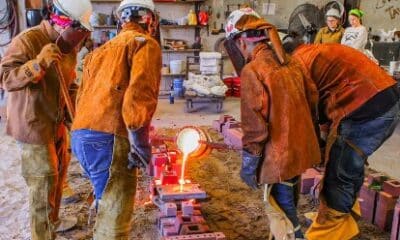
 Our Mississippi Home7 days ago
Our Mississippi Home7 days agoCreate Art from Molten Metal: Southern Miss Sculpture to Host Annual Interactive Iron Pour
-

 Local News5 days ago
Local News5 days agoCelebrate the holidays in Ocean Springs with free, festive activities for the family
-
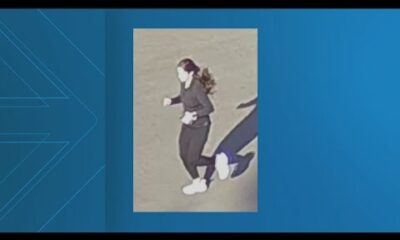
 News from the South - Georgia News Feed6 days ago
News from the South - Georgia News Feed6 days ago'Hunting for females' | First day of trial in Laken Riley murder reveals evidence not seen yet
-

 News from the South - Alabama News Feed6 days ago
News from the South - Alabama News Feed6 days agoFirst woman installed as commanding officer of NAS Pensacola
-

 Kaiser Health News3 days ago
Kaiser Health News3 days agoA Closely Watched Trial Over Idaho’s Near-Total Abortion Ban Continues Tuesday
-

 Mississippi Today5 days ago
Mississippi Today5 days agoOn this day in 1972
-

 News from the South - Alabama News Feed2 days ago
News from the South - Alabama News Feed2 days agoTrial underway for Sheila Agee, the mother accused in deadly Home Depot shooting
-

 News from the South - Alabama News Feed2 days ago
News from the South - Alabama News Feed2 days agoAlabama's weather forecast is getting colder, and a widespread frost and freeze is likely by the …





